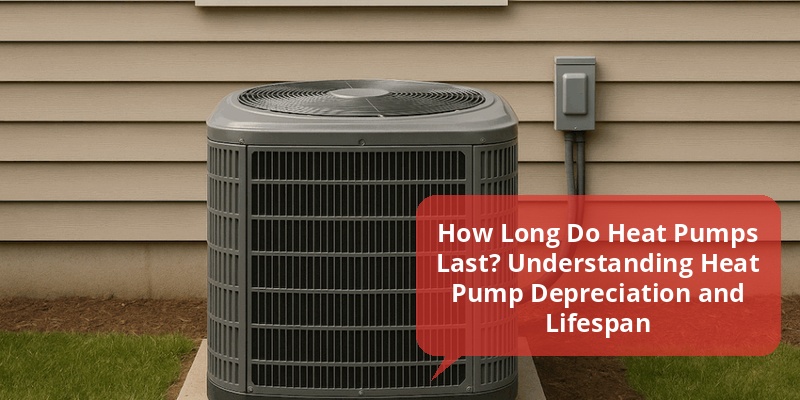Heat pumps are a popular, energy-efficient option for heating and cooling homes in the United States. For many homeowners and businesses, understanding how heat pump depreciation works alongside their expected lifespan is crucial for budgeting and maintenance planning. Heat pump depreciation refers to the gradual reduction in the appliance’s market value over time, influenced by wear, technological advancements, and efficiency declines. This article delves into the typical lifespan of heat pumps, factors that affect their longevity, and insights on managing depreciation effectively.
| Aspect | Details |
|---|---|
| Typical Heat Pump Lifespan | 10 to 15 years |
| Average Depreciation Period | 7 to 12 years |
| Key Factors Affecting Lifespan | Climate, maintenance, usage, system quality |
| Maintenance Impact | Regular maintenance can extend lifespan by 20-30% |
| Signs of Depreciation | Reduced efficiency, increased repair frequency |
What Is Heat Pump Depreciation?
Heat pump depreciation is the process by which the system’s value and efficiency decline over time due to aging, wear and tear, and technological obsolescence. This depreciation impacts resale value, insurance considerations, and tax deductions for businesses. Generally, heat pumps depreciate faster within the first few years as newer, more efficient models enter the market, but their operational life can extend beyond this period with proper care.
Typical Lifespan of Heat Pumps
Most residential heat pumps have an expected lifespan of about 10 to 15 years. However, several factors influence the longevity, such as:
- Manufacturer Quality: Premium brands and models tend to last longer.
- Installation Quality: Proper installation ensures efficient operation and fewer breakdowns.
- Operating Conditions: Extreme climates (very cold or hot) can reduce lifespan.
- Maintenance: Regular servicing prolongs operational life.
Commercial heat pumps typically have similar lifespans but may vary depending on usage intensity.
Factors Affecting Heat Pump Depreciation and Lifespan
Climate and Environmental Conditions
Cold climates tend to stress heat pumps more because the system works harder to extract heat, while hot climates impact cooling efficiency. This increased workload accelerates wear, leading to faster depreciation.
Usage Patterns
Homes with steady, moderate use experience longer heat pump life compared to those with heavy seasonal or continuous use. Systems running constantly in extreme weather may require earlier replacement.
Maintenance and Repairs
Regular maintenance, such as cleaning filters, lubricating components, and checking refrigerant levels, can extend heat pump life by up to 30%. Neglecting maintenance not only speeds up depreciation but also increases energy costs.
Technological Advancements
Innovations in heat pump technology can make older models less desirable, influencing depreciation more from a market perspective than physical deterioration.
Heat Pump Depreciation for Tax and Financial Purposes
For businesses and property owners, understanding heat pump depreciation helps in tax deductions and asset management. The IRS commonly assigns a 7-year depreciation schedule for HVAC equipment, including heat pumps. This schedule allows owners to recover the cost of the system over several years for accounting and tax purposes.
| Depreciation Method | Description | Typical Period |
|---|---|---|
| MACRS (Modified Accelerated Cost Recovery System) | IRS method for asset depreciation including HVAC systems | 7 years |
| Straight-Line Depreciation | Evenly spreads depreciation over the useful life | 10-15 years (matching lifespan) |
| Declining Balance Method | Accelerated depreciation in early years | Varies |
Extending the Lifespan and Managing Depreciation
Homeowners can maximize their heat pump’s lifespan and slow depreciation by implementing several strategies:
- Schedule annual professional inspections to catch early issues.
- Replace or clean air filters every 1-3 months to maintain airflow.
- Keep outdoor units clear of debris and vegetation for proper ventilation.
- Upgrade older models with energy-efficient units to save on energy bills and improve system reliability.
These steps not only preserve the equipment’s value but also enhance energy savings.
Recognizing Signs That Your Heat Pump Is Depreciating
Awareness of declining system performance helps homeowners decide when to repair or replace their heat pump. Common signs include:
- Higher energy bills despite similar usage.
- Frequent breakdowns or repairs.
- Uneven heating or cooling in your home.
- Unusual noises or vibrations from the unit.
- Older systems lacking modern efficiency features.
Heat Pump Replacement Considerations
Replacing a heat pump is a major investment. Consider the following when deciding to replace:
- Age: Systems older than 15 years are often less efficient and more costly to maintain.
- Repair costs: If repair costs exceed 50% of replacement cost, it is often better to upgrade.
- Energy efficiency gains: New models provide significant energy savings and environmental benefits.
- Incentives and rebates: Many states offer programs that offset replacement costs for energy-efficient heat pumps.
Heat Pump Depreciation vs. Other HVAC Systems
Compared to furnaces and air conditioners, heat pumps offer a combined heating and cooling solution, which can improve value over time. However, their lifespan is similar to these systems, typically around a decade or more.
Heat pumps depreciate similarly in terms of value, but their dual functionality often encourages more frequent upgrades to newer, efficient units due to rising energy standards and consumer demand.
